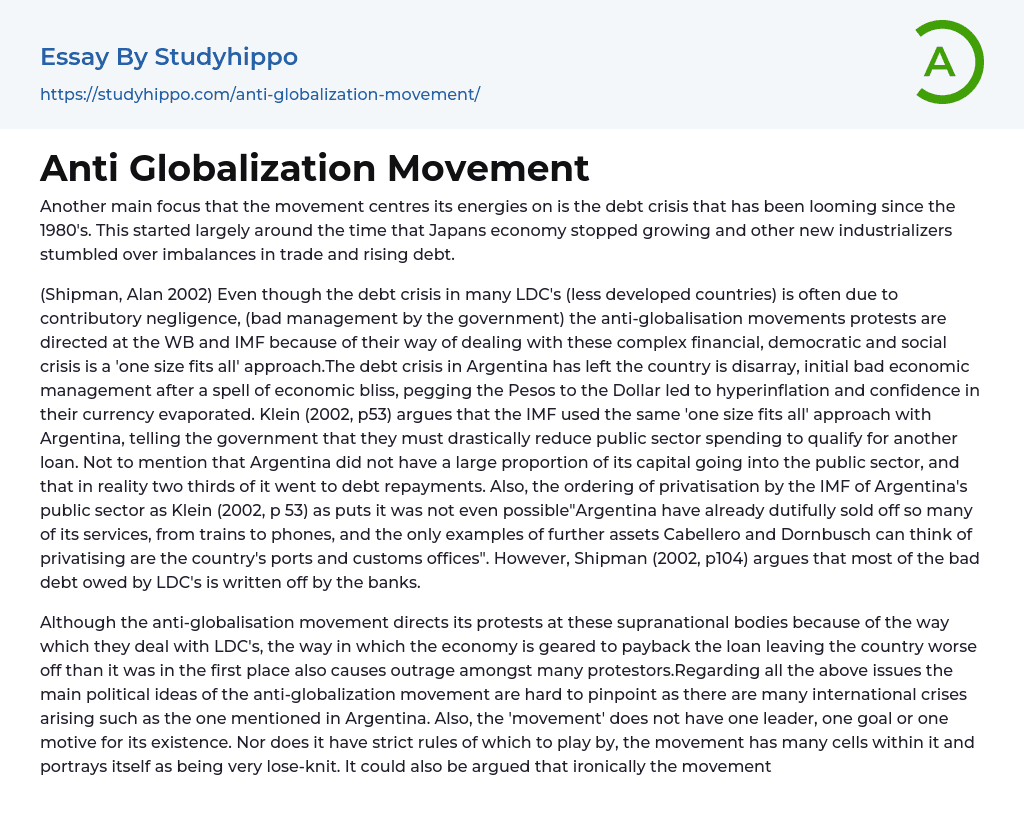The movement puts a significant emphasis on addressing the debt crisis that emerged in the 1980s, coinciding with Japan's economic stagnation and other newly industrialized nations facing trade imbalances and increasing debts.
(Shipman, Alan 2002) The debt crisis in many LDC's (less developed countries) is often attributed to bad management by the government. However, the anti-globalisation movements protests are aimed at the WB and IMF because they use a 'one size fits all' approach when dealing with complex financial, democratic, and social crises. Argentina's debt crisis resulted from initial bad economic management, pegging the Pesos to the Dollar, leading to hyperinflation and loss of confidence in their currency. The IMF ordered Argentina to drastically reduce public sector spending to qualify for another loan even though two thirds of their capital went towards debt repayments, not public
...sector spending. Klein (2002, p53) argued the IMF's order to privatize Argentina's public sector was not feasible as many services were already privatized. However, Shipman (2002, p104) argues that most of the bad debt owed by LDC's is canceled by banks.
The anti-globalisation movement expresses its discontent towards supranational bodies for their handling of LDCs, as well as the damaging effects of economies that pay back loans leaving countries worse off than before. The movement's political ideas are difficult to define due to multiple crises, such as those in Argentina, and the absence of a singular leader, goal, or motive. Similarly, the movement lacks strict rules and operates through various loosely connected cells. Ironically, the movement has also become global.
Moreover, the current capitalist system lacks a singular solution according to the 'movement' and there is uncertainty on
how the state structure should be. As economic, political, and social crises persist, the movement's primary political ideas will continue to develop and vary. The increasing inequality between the affluent and the impoverished fosters additional upheaval, protests, and destitution globally.
Critical Bibliography
Epstein, B.
(2001) The Anti Globalization Movement and Anarchism can be accessed online at http://www.globalpolicy.org.
- Anthropology essays
- Audience essays
- Charity essays
- Cultural Competence essays
- Emile Durkheim essays
- Gender Roles essays
- Generation essays
- Globalization essays
- Interpersonal Relationship essays
- People essays
- Race essays
- Social Change essays
- Social Class essays
- Social Movement essays
- Social Science essays
- Social Status essays
- Social Stratification essays
- Society essays
- Sociological Imagination essays
- Sociological Perspective essays
- Sociological Theories essays
- Stereotypes essays
- Web Dubois essays
- American Dream essays
- Barriers To Entry essays
- Capitalism essays
- Central Bank essays
- Compensation essays
- Consumerism essays
- Economic Development essays
- Economic Growth essays
- Economic Inequality essays
- Economic System essays
- Economy essays
- Employment essays
- Export essays
- Finance essays
- Free Trade essays
- Gross Domestic Product essays
- Human Development essays
- Income Inequality essays
- Industry essays
- Inflation essays
- International Business essays
- International Trade essays
- Macroeconomics essays
- Materialism essays
- Max Weber essays
- Microeconomics essays
- Minimum Wage essays




